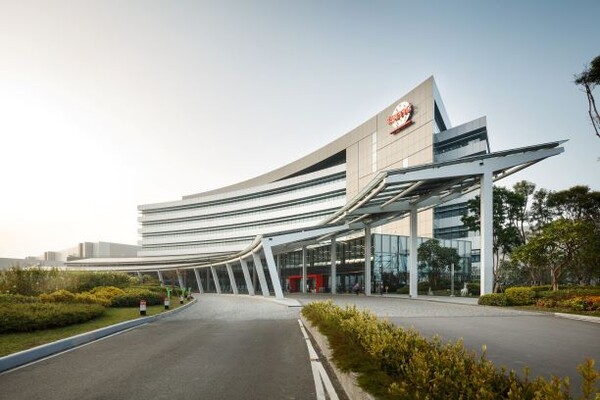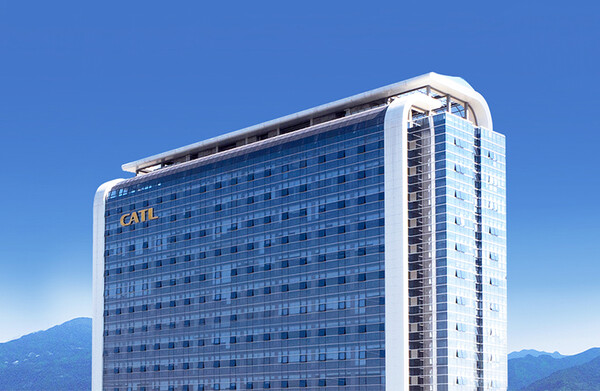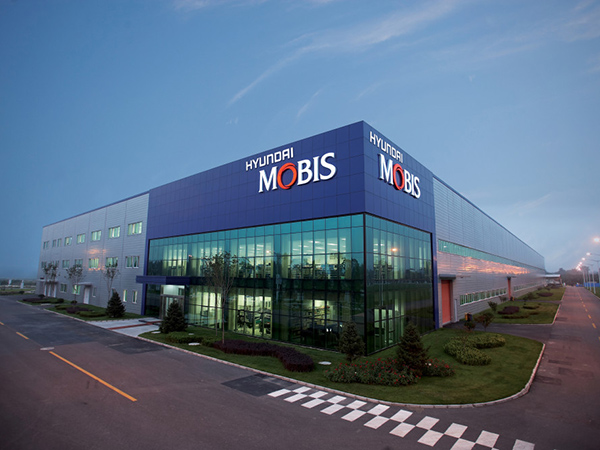
TSMC Tainan Fab 18
The US will abolish blanket permits for exporting US semiconductor equipment to Samsung and SK’s Chinese factories.
According to the Federal Register on the 29th (local time), the U.S. Department of Commerce announced that it would abolish the blanket license that allowed Samsung Electronics and SK Hynix to avoid having to obtain individual permits when supplying U.S. semiconductor manufacturing equipment to production facilities in China.
In this official gazette released in advance on this day ahead of the official publication on the 2nd of next month, the U.S. Department of Commerce’s Bureau of Industry and Security (BIS) announced that it will exclude three Chinese corporations, including Intel Semiconductor Limited (located in Dalian), Samsung Semiconductor Limited, and SK Hynix Semiconductor Limited, from the list of “Verified End Users” (VEUs).
Intel Semiconductor Co., Ltd., located in Dalian, China, as listed in the official gazette, was acquired by SK Hynix, so this is also a production facility of a Korean company in China.
Alibaba develops AI semiconductors
Alibaba, China’s largest cloud company, has developed a new artificial intelligence (AI) semiconductor, the Wall Street Journal (WSJ) reported on the 29th (local time).
As exports of Nvidia H20 semiconductors to China are being disrupted due to export controls imposed by the Donald Trump administration and suspicions of a “backdoor” by the Chinese government, expectations are growing that Chinese companies, including Alibaba, will fill the gap.
Shanghai-based MetaX unveiled a new chip last month that it said could replace Nvidia’s H20 chip. Beijing-based Cambricon Technologies is also threatening Nvidia’s presence in the Chinese market. Cambricon reported $247 million in revenue in the second quarter, fueled by a surge in AI chip orders.
TSMC Reaches 60% Yield for 2nm Semiconductor Processing…Full-Scale Production Begins in Q4
Taiwanese media outlets, including Liberty Times, reported on the 29th that TSMC, the world’s largest foundry (semiconductor contract manufacturing company), has reached a 60% yield (the percentage of good products among finished products) for its cutting-edge 2nm (nanometer; 1nm is one billionth of a meter) semiconductors.
According to reports, TSMC achieved these results in the 2nm trial production, which will be mass-produced at its Baoshan Fab 20 (semiconductor production plant) in the northern Hsinchu Science Park and its Kaohsiung Fab 22 in the south in the fourth quarter of this year (October to December).
Citing sources, media outlets reported that yields will increase further when 2nm mass production begins in earnest in the fourth quarter.
Korean company acquires semiconductor process lamp manufacturer, which relies entirely on overseas suppliers.
According to the Ministry of Trade, Industry and Energy, FNS Tech acquired Taiwanese semiconductor parts company Asahi Lamp for 10.8 billion won.
Asahi Lamp is a company that possesses manufacturing technology for tungsten halogen lamps used in semiconductor rapid thermal processing (RTP) and epitaxial layer deposition (EPI) processes, and supplies its products to companies such as TSMC.
Until now, high-power semiconductor process lamps have not been produced domestically, so Korean companies have been entirely dependent on imports.
Next-generation semiconductor processing equipment, CO₂ chillers, are exported for the first time to the US.
Global Standard Technology (GST), a semiconductor equipment manufacturer, has agreed to export carbon dioxide chillers to the United States for the first time, enabling it to avoid environmental regulations in both the United States and the European Union (EU). Chillers are essential equipment for maintaining a constant temperature within semiconductor processes, and existing Freon-based chillers are scheduled to be banned in the US and EU as early as next year.
Typically, semiconductor manufacturing processes use chillers powered by Freon-based refrigerants to maintain temperature. However, because Freon-based refrigerants generate greenhouse gases during production, a movement to ban them is gaining momentum. Under the Made in America Innovation Act (AIM), the United States plans to restrict the import of chillers using refrigerants with a global warming potential (GWP) of 700 or higher starting next year.
ChipSke, the “heart of next-generation power,” succeeds in domestically producing 650V GaN.
Gyeonggi Province announced on the 25th that fabless startup ChipSky succeeded in mass producing 650V gallium nitride (GaN) power semiconductors for the first time in Korea.
ChipSke, a GaN power semiconductor design specialist, is a representative example of a company that received support from the Gyeonggi Province Testbed Semiconductor Technology Development Project in 2023. The company began full-scale mass production of GaN-on-Si-based 650V power semiconductors in June and completed international patent and trademark registration for related technologies with the World Intellectual Property Organization (WIPO).
ChipScale’s products feature a single-chip structure that allows for stable operation even at high temperatures (150 degrees) and miniaturization and high speed.
Japan’s Rapidus shifts to 2nm production… Will it become a competitor to Samsung Electronics?
Japan’s Rapidus has entered the tapeout stage (the stage where the design is completed and the actual production process begins) of a 2nm chip just three years after its launch.
Currently, the ultra-fine foundry process market is dominated by TSMC, with Samsung Electronics and Intel closely following. With Japanese companies joining the fray, competition is expected to enter a new phase.
According to industry sources on the 29th, Rapidus recently announced on its website that it has “started manufacturing test chips with a 2-nanometer (nm, one billionth of a meter) gate-all-around (GAA) transistor structure at ‘IIM-1’ in Chitose, Hokkaido.” ‘IIM-1’ is a state-of-the-art chip test production line.

CATL Headquater
Tesla Overtakes BYD in European Electric Vehicle Market Share
According to new car registration data for July released by the European Automobile Manufacturers’ Association (ACEA) on the 28th (local time), Tesla sold 8,837 new vehicles in July, a 40.2% decrease from the same month last year (14,769 units). In contrast, China’s BYD sold 13,503 units in July, a 225.3% increase compared to the same month last year (4,151 units). This represents a more than threefold increase in European sales in just one year.
Tesla’s overall European car market share fell to 0.8% from 1.4% a year ago, while BYD overtook Tesla, increasing its share to 1.2% from 0.4%.
US electric vehicle subsidies are about to expire.
According to industry sources on the 29th, the U.S. government will end the Inflation Reduction Act (IRA) tax credit of up to $7,500 (approximately 10 million won) for new electric vehicle purchases, starting on the 30th of next month. The sudden elimination of this benefit, originally scheduled to last until 2032, is expected to significantly impact the price competitiveness of electric vehicles.
Industry insiders predict a temporary surge in “panic buying” just before subsidies expire. However, the prevailing view is that a sharp decline in demand will inevitably lead to a decline in sales.
As local companies such as Tesla and General Motors (GM) strengthen their price-cutting strategies, some point out that Hyundai Motor Group may find it difficult to close the price gap with them.
The combined market share of the three battery companies is less than half that of China’s CATL.
The decline of K-battery, once a global leader, is evident in the numbers. In the first half of this year, the combined market share (16.5%) of the three Korean battery companies—LG Energy Solution, SK On, and Samsung SDI—was less than half that of China’s CATL (37.9%).
As recently as 2021, Korea dominated the global battery industry. The three K-battery companies, along with CATL, were part of the “Global Big Four.” At the time, the top four companies held market share: LG Energy Solution (10.7%), CATL (10.5%), Samsung SDI (7.6%), and SK On (7.5%). The dramatic reversal of the global battery industry landscape in just four years stemmed from the rapid advancement of Chinese companies, backed by massive government subsidies and a massive domestic market.
Doosan Bobcat Opens Battery Pack Research Center for Construction Equipment, Accelerating Electrification
Doosan Bobcat announced on the 27th that it has opened the ‘eFORCE LAB’, a research institute for battery pack technology verification and development, inside the Indukwon LDC Biz Tower in Anyang, Gyeonggi Province.
The name “Epos Lab” combines the first letters of “electrification,” “energy,” and “eco-friendly,” plus the word “force.” Doosan Bobcat said the name signifies the lab’s commitment to developing eco-friendly energy technologies for electrified equipment.
Doosan Bobcat installed its self-developed LFP (lithium iron phosphate) type battery pack in its forklifts in the second half of last year, and has shipped more than 100 units to date.
EcoPro and SK On Partner to Build a Battery Circulation Ecosystem
EcoPro announced on the 25th that it signed a ‘Battery Circulation Ecosystem Business Agreement’ and a Black Powder supply contract at the EcoPro Seoul office in Seocho-gu, Seoul on the 22nd with the attendance of Park Seok-hoe, CEO of EcoPro C&G, Jeong Hoe-rim, Director of EcoPro Management Strategy, and Lee Gyeong-min, Director of SK On Business Development.
Black powder is a black powder made by crushing secondary battery scrap (defective products) and used batteries. It is evaluated as the ‘crude oil of batteries’ because it contains lithium, nickel, cobalt, manganese, and other major metal components in secondary batteries in a concentrated state.
Under this contract, EcoPro C&G, which is in charge of the battery recycling business within the EcoPro Group, will receive black powder based on scrap battery waste from SK Battery America (SKBA), a US subsidiary of SK On.
Lithium prices hit a yearly high, raising expectations for a rebound in the battery industry.
According to the Korea Resources Information Service (KOMIS) of the Korea Mining and Resources Corporation (KMRC), the price of lithium carbonate was 86.0 yuan per kilogram as of the 20th, up about 28% from the previous month’s average. This is the highest price this year.
Lithium prices, which had fallen to 57.7 yuan in May and June, rebounded this month and have continued their steep rise since hitting 71.7 yuan on the 8th. The battery industry views 70 yuan as a psychological threshold for assessing profitability.
This rebound is due to China’s production restrictions. Since last month, China has been strictly issuing mining permits in accordance with its Mineral Resources Law.
SKIET implements unpaid leave for employees with two years or more of service.
SK IE Technology (SKIET) is implementing an unpaid leave program for employees with at least two years of service. Founded in 2019 as a spin-off from SK Innovation’s materials division, SK IE Technology produces separators for lithium-ion batteries.
This is interpreted as an attempt to overcome the electric vehicle chasm (a temporary stagnation in demand). SK Innovation’s other subsidiary, SK On, also implemented voluntary retirement and unpaid leave for self-development in September of last year.

HuyndaiMobis
Hyundai Mobis has identified semiconductors and robotics as new growth engines for its future.
To realize its new vision of leading the new paradigm of the future mobility market, Hyundai Mobis is accelerating its efforts to secure leading technologies in key future product areas, including electrification and SDV (software-centric vehicle) solutions. The company is also working to secure independent capabilities in automotive semiconductors and robotics, two new growth engines.
Hyundai Mobis President Lee Kyu-seok announced this plan at the ‘2025 CEO Investor Day’ held at the Fairmont Hotel in Yeouido, Seoul on the 27th, attended by investors, analysts, and credit rating agency representatives.
35% of US consumers still disapprove of Tesla’s self-driving technology.
According to the American economic media outlet CNBC on the 29th (local time), in a survey of 8,000 Americans conducted by consulting firm Slingshot Strategies this month, 35% of respondents answered that FSD had a negative impact on whether or not to purchase a Tesla vehicle.
Only 14% of all respondents said that FSD had a positive impact on their decision to purchase a Tesla, while the remaining 51% said that FSD had no significant impact on their decision to purchase a Tesla.
Nearly half of consumers who participated in the survey indicated that FSD technology should be legally regulated.
Hyundai Motor to Build Robot Hub in the US
The core of Hyundai Motor Group’s additional investment plan in the United States, announced on the 25th (local time), is the establishment of a robotics factory. Hyundai Motor Group plans to invest $5 billion (approximately 7 trillion won) to produce approximately 30,000 robots annually in the United States. While specific details, such as the timing and location of the plant and the products to be produced, were not disclosed, industry observers speculate that the plant will produce Spot, a quadruped robot developed by Boston Dynamics, and Atlas, a humanoid robot.
As its rival Tesla has decided to produce 50,000 humanoid Optimus vehicles annually starting in 2026, there are predictions that Hyundai Motor Group will also have a similar production scale.
Ibis and Unicore Partner to Develop Integrated Autonomous Personal Mobility Control
Ibis, a vehicle mobility software company, announced on the 28th that it has signed a memorandum of understanding (MOU) for technical cooperation with Unicore Robotics, a robot mobility specialist, for the ‘development of an integrated control system for autonomous personal mobility.’
This agreement is intended to respond to the growing demand for autonomous driving and control technology alongside the spread of personal mobility. The two companies plan to jointly pursue the development of autonomous driving and control technology linked to personal mobility, the development of a mobility-control linkage interface, and the exchange and cooperation of related technologies.
Based on its accumulated technological prowess in the field of embedded software for vehicles, Ibis has been supplying software and its self-developed vehicle data platform, ‘Alton,’ to Hyundai Motor Company, LG Electronics, and Hyundai Mobis.
Google’s Waymo receives first permit to test self-driving cars in New York.
Waymo, Google’s autonomous driving subsidiary, has received its first permit to test its self-driving cars in New York City, Fox Business reported on the 25th (local time). Headquartered in California, Waymo operates a fleet of approximately 1,500 vehicles and has recorded over 10 million rides in five U.S. cities, including San Francisco, Phoenix, and Austin.
The permit from New York City allows Waymo to test up to eight self-driving cars in parts of downtown Manhattan and Brooklyn.

iPhone 16 Pro. /Photo = Apple
OLED panels for next year’s iPhones will also have a robust supply chain in Korea and China.
Samsung Display, LG Display, and BOE are expected to solidify their position as OLED supply chain partners for Apple’s iPhones this year and next. Samsung Display, in particular, is expected to expand its product lineup in response to mass production of Apple’s first foldable iPhone.
Last year, Samsung Display shipped 63.8 million units for the iPhone 16 series and 124 million units for all iPhones. This year, shipments for the iPhone 17 series are expected to reach 78 million units, and total shipments are expected to reach 125 million units. Based on its stable quality and large-scale production capacity, Samsung Display is expected to solidify its position as the largest panel supplier to Apple.
Last year, LG Display supplied 42 million units for the iPhone 16 series and 67.42 million units overall. This year, these figures are expected to increase to 45.6 million and 75.1 million units, respectively. LG Display maintains its position as the second-largest supplier after Samsung and is also gaining prominence in the production of high-end LTPO panels.
Youngwoo DSP signs a 17.9 billion won equipment supply contract with Samsung Display.
Youngwoo DSP announced on the 26th that it has signed a display equipment supply contract worth 17.9 billion won with Samsung Display Vietnam. This order represents 30.3% of Youngwoo DSP’s sales of 59 billion won in the previous year.
Youngwoo DSP is a display inspection equipment company specializing in the manufacture and sale of organic light-emitting diode (OLED) and semiconductor equipment. Its core equipment is panel manufacturing process inspection equipment, used to inspect display cells and modules.
Recently, we are also pursuing new businesses such as semiconductor inspection equipment and secondary battery inspection equipment.
source : kipost.net

Leave a Reply